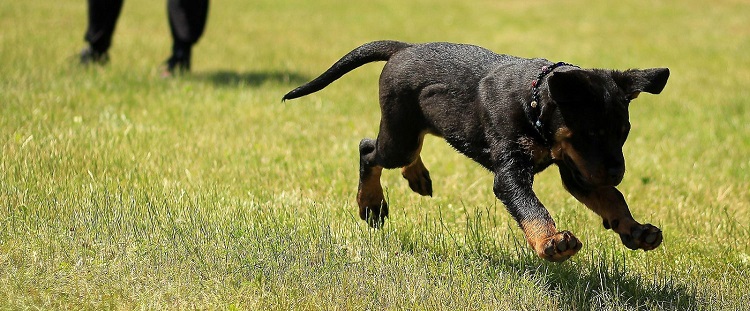My young dog becomes lame after being active all day. What is the cause and what should our next steps be?
Original Question: Josie is a rescue, 2-year-old Rottie. She is inclined to be SUPER active, which is why we feel she was surrendered. We have a horse farm, and Josie has taken to farm life wonderfully and she is an amazing, loving dog. She is also our beloved companion. However, I worry because after activity, she is mildly to markedly lame after being active all day. I worry this will shorten her life. Is there a good anti-inflammatory I can give her? She is not great at going to the vet. I feel she has been muscled around and has a tendency to snap when confined. This is the only “ flaw” in her temperament and I feel it is a learned behaviour that we can overcome. Currently I add 1 ounce of ground flax for its anti-inflammatory benefits and supplement her with about 300 iu of pure, natural vitamin E. I do give her Previcox when she is quite lame. Josie is in good weight for her frame, perhaps a tiny bit heavy from helping clean up high fat horse feed which I am working to curtail! Thanks! - Wendy
 Aug 4, 2018
Aug 4, 2018
Hi Wendy,
Thanks for your question.
There are a few things I become concerned about when I read your question. First, this breed is not one that is known for its ability to run all day long. I’m sure she will because she is keeping up with the lifestyle she is accustomed to out there, but the fact that she is coming up lame after all of that activity is a concern. There are a few possibilities that I can share with you but keep in mind that I cannot be certain about the exact nature of the problem. You’ll need to see your veterinarian for a physical examination and consultation to start to determine that. I also am not allowed to offer advice on medicating your dog based on licensing restrictions. It would be dangerous and irresponsible of me to do that. A quick call to your regular veterinarian would be advised to answer the question about anti-inflammatory use. However, I can certainly share a few thoughts with you.
This breed is not adapted to performing physical activity all day. They are medium to large breed dogs that carry a good amount of weight on their limbs. It’s possible that the amount of activity is creating some inflammation in her joints and therefore creating the symptoms you’re seeing. If this is indeed the issue and it continues to occur, then the joints will go through some degeneration and the cartilage could become damaged, creating a condition known as degenerative joint disease at a young age. So my first recommendation is to control the level of exercise to prevent the occurrence of these symptoms.
This breed is also known to have developmental joint abnormalities that can be expressed around the age of 1-3 years old. A defect in the development of the cartilage in the joint of one of the limbs has been known to occur in this breed. It is a hereditary problem that is well defined and identified. If this exists, it could be the reason for the symptoms and so when you do see your veterinarian about this, I would discuss the possibility of radiographs to assess the integrity of the joints.
There are other traumatic injuries that could have occurred to create the condition you’re seeing. A partially or fully ruptured cruciate ligament in one of the stifle (knee) joints could be present, or a soft tissue injury to the ligaments and tendons could be present, or a more serious injury to the cartilage or area of bone could have occurred. All of these conditions can be assessed with radiographs performed by your veterinarian. Often there is the need to give a sedative to get accurate stable images and to feel the structures within the limbs could be necessary.
I would give you a quick word of warning. She is a young dog. If she has a subtle defect that is creating this problem, there is the strong possibility that it will worsen with time and create a more serious situation down the road. I recommend you have this assessed thoroughly. It’s easy to pass off a simple lameness as trivial, but it could indicate a deeper more chronic and complex problem.
I hope this helps,
Dr. Clayton Greenway
Disclaimer: healthcareforpets.com and its team of veterinarians and clinicians do not endorse any products, services, or recommended advice. All advice presented by our veterinarians, clinicians, tools, resources, etc is not meant to replace a regular physical exam and consultation with your primary veterinarian or other clinicians. We always encourage you to seek medical advice from your regular veterinarian.

